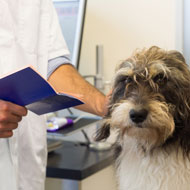BVA calls for changes to Pet Travel Scheme post-Brexit

“Whatever agreement we reach with the EU, it is essential that the movement of animals doesn’t translate into the free movement of disease."
As the UK prepares for Brexit, the BVA is calling for a series of measures to prevent exotic and zoonotic diseases - including rabies - from entering the country.
BVA has published a Pet Travel policy, which includes 15 recommendations, including a plea to extend the post-rabies vaccination waiting time to 12 weeks. It is hoped this would minimise the risk of rabies entering the UK, whilst reducing the illegal trade in puppies.
Other recommendations in the policy include:
- compulsory tick and tapeworm treatment for all cats and dogs travelling under the Pet Travel Scheme (PETS)
- shortening the tapeworm treatment window from 24-120 hours, to 24-48 hours before entry from infected countries
- restricting the number of animals that can travel under PETS to five per non-commercial consignment, rather than five per person
- improving enforcement services and surveillance at entry points to the UK.
BVA is also recommending restrictions on the movement of stray dogs from countries that are endemic for diseases that are not currently endemic in the UK, including brucellosis, babesiosis and leishmaniasis. There should also be mandatory testing for such diseases before stray dogs can travel to the UK.
The Pet Travel Scheme made pet transport between the UK and other EU countries easier and more cost effective, but it has raised serious concerns about the risk of disease being brought to the UK via travelling pets or ’trojan’ rescue dogs. BVA said prospective pet owners should be encouraged to rehome dogs from UK rehoming charities, rather than overseas.
Vets and animal welfare charities are also concerned about the illegal importation of puppies through abuse of the non-commercial pet travel requirements.
BVA president John Fishwick said: “Whatever agreement we reach with the EU, it is essential that the movement of animals doesn’t translate into the free movement of disease.
“The increase in cases of non-endemic diseases such as babesiosis is of real concern to vets, which is why we are calling on the government to strengthen existing pet travel legislation as well as enforcement for the sake of animal and human health in the UK.”



 The veterinary mental health charity Vetlife is inviting the veterinary community to join it for a sponsored cold-water dip.
The veterinary mental health charity Vetlife is inviting the veterinary community to join it for a sponsored cold-water dip.